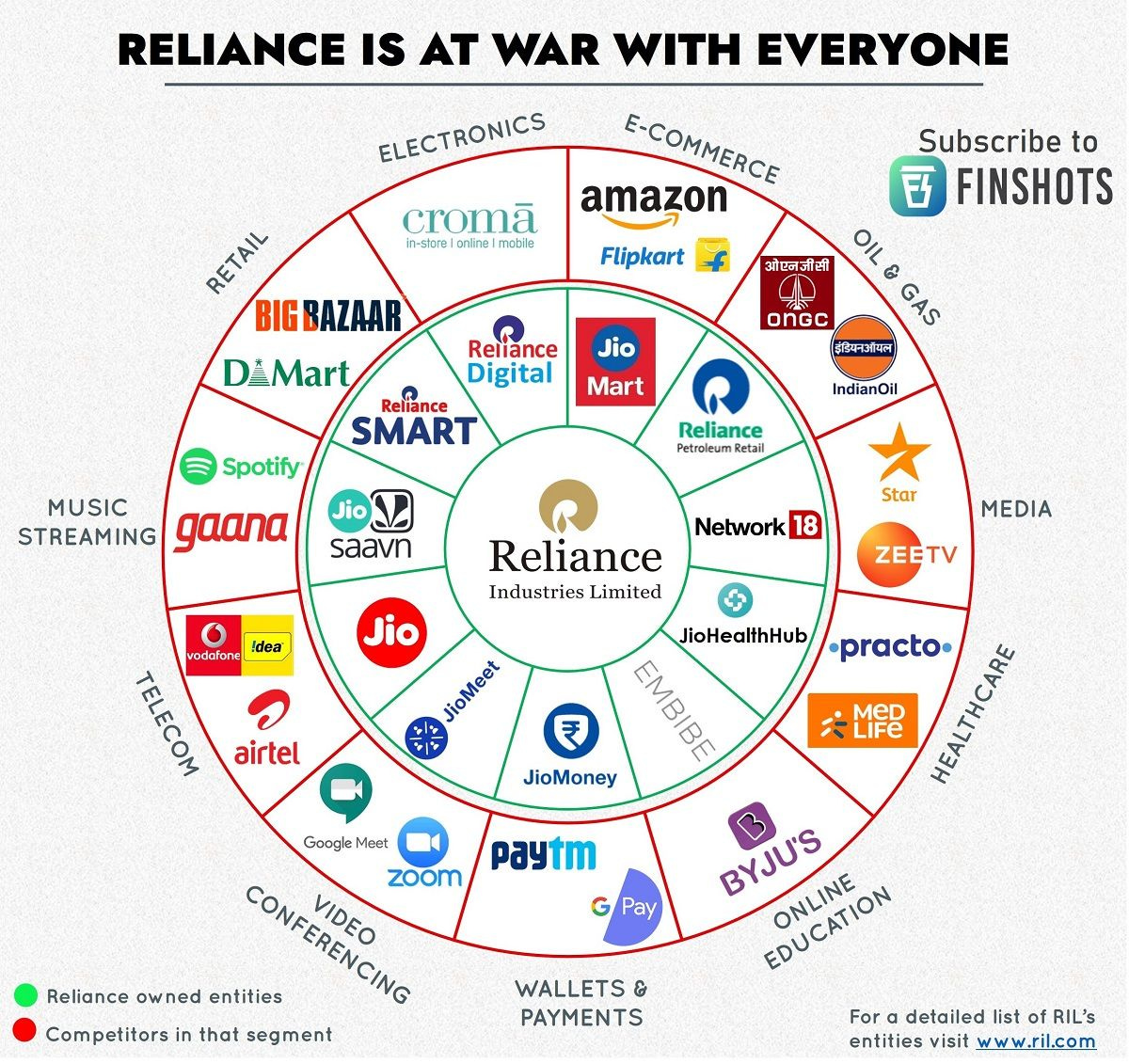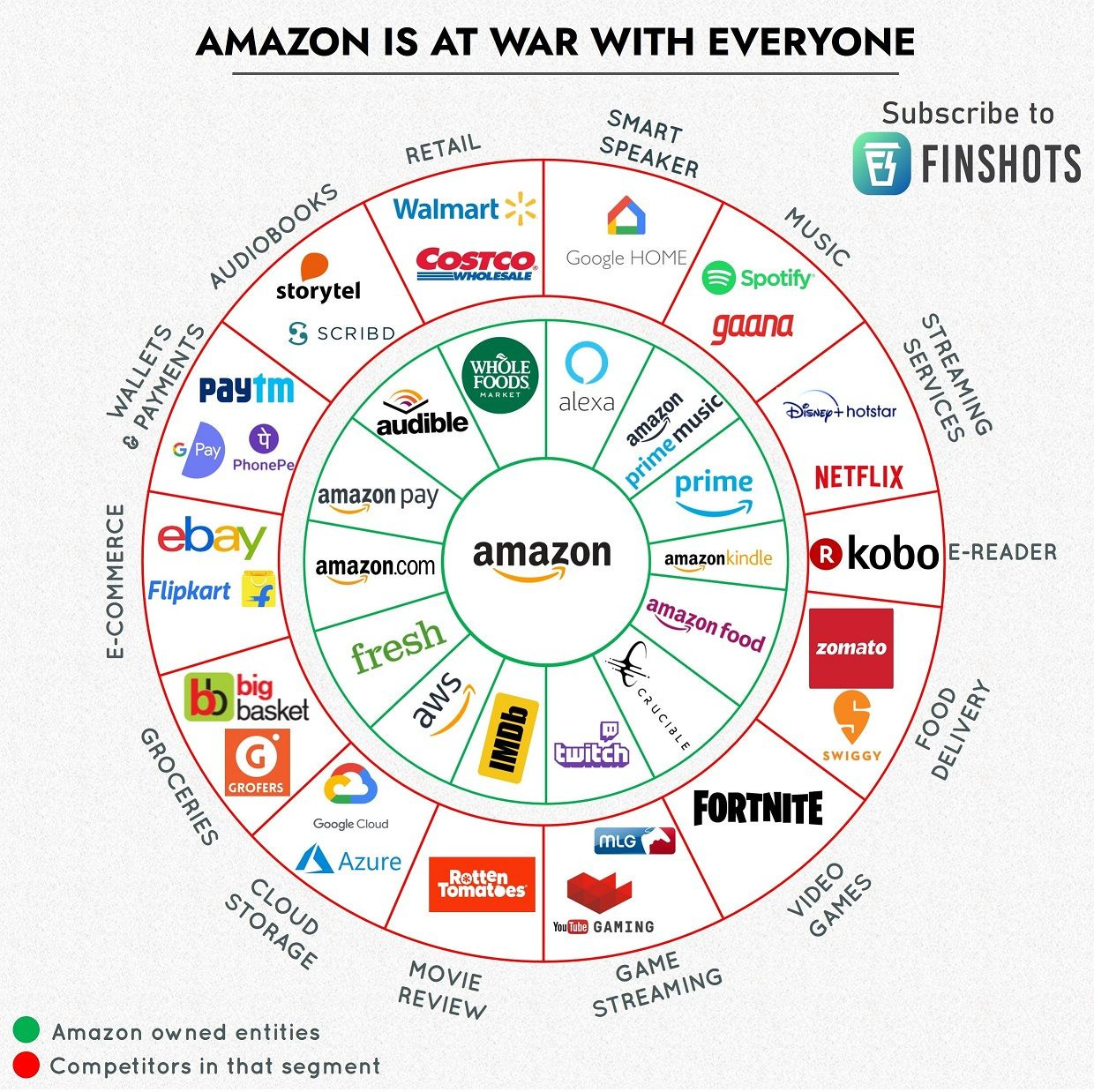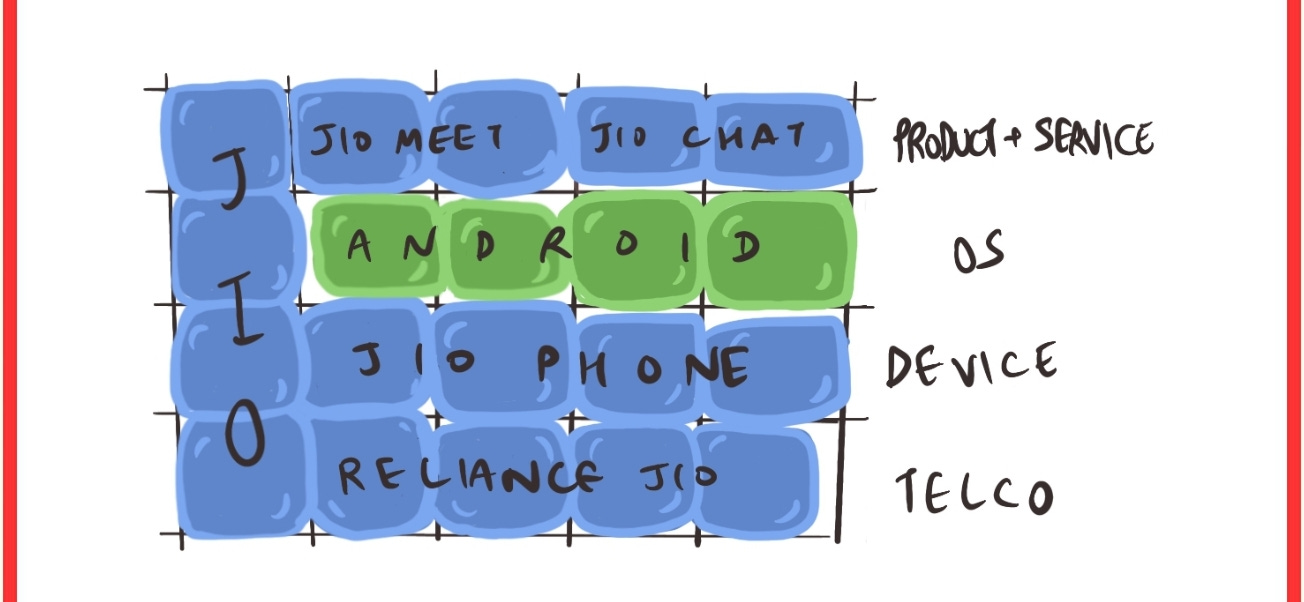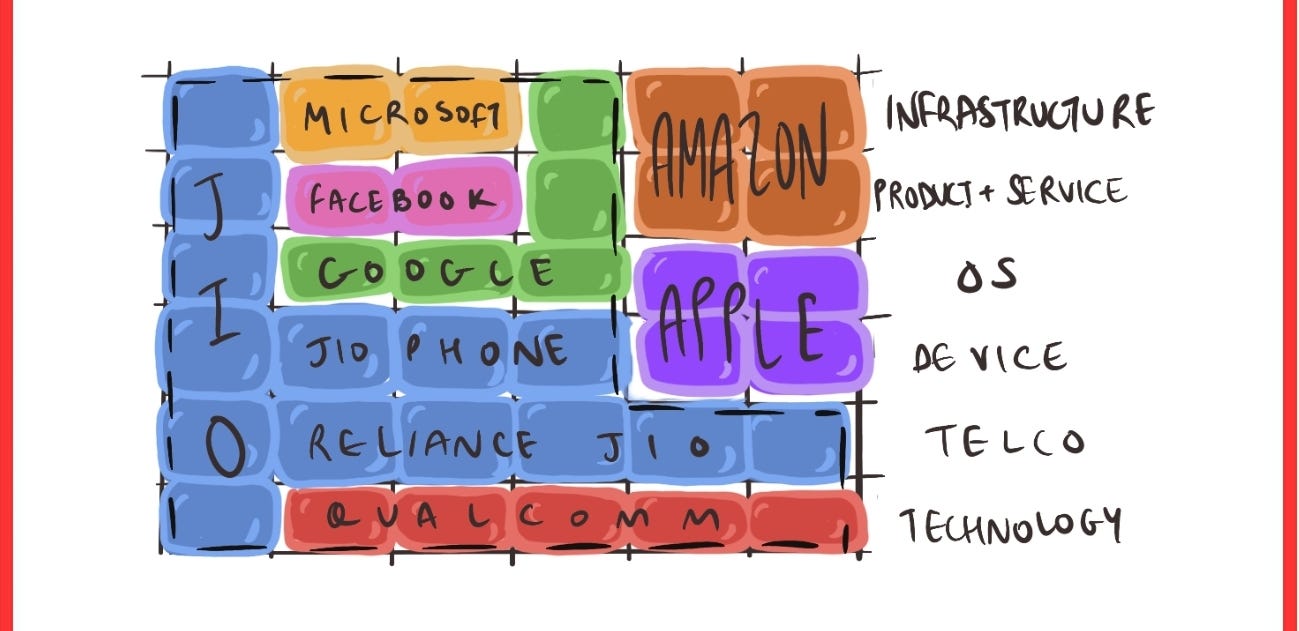Self Reliance
Atma Nirbhar ka saransh
Welcome to our Fifth issue of Focus series at the duologue. The reading time to finish this one is around 12 mins.
The Duologue is a concerted effort by Vivek and Bheem to make sense with a unique lens. Now, on to the post!
Hey !
The spotlight that was bestowed on Jio was synonymous to the funding it raised in the past 2 months. The writing is loud and clear, they are here to take it all.
The coverage culminated with the recent AGM of Reliance. [1] It was a good time to write a follow up to the Original Post I wrote on the FB-Jio deal.[2] But there is no way I could write something half decent as the ones being written on the internet. So, decided to take the focus route to highlight, infer and predict about Jio and Reliance’s plan.
Backdrop
Vedica Kant has a series of nuanced posts on the history of Reliance and a deep dive backgrounder culminating with the recent events. She covered all the bases in terms of history, context, policy and strategy. This is commendable work. I would appreciate if all of you go read her work in its entirety and let her know just how good her work is.
In her Part 1 post, she writes about the Origins of the company until Dhirubhai's time. [3] What you will witness is that this family never lacked ambition. Starting as a Yarn trader and ending up building a conglomerate with the largest refinery in the world is a worthy and commendable endeavour.
Ambani's story once he came back to India is relatively well known. With an initial capital of Rs. 100,000, he started a business trading spices and textiles, Reliance Commercial, with his second cousin. Though the two soon parted ways, Ambani continued to push forward with Reliance focusing on trading synthetic yarns. India's textile industry was hard hit by partition, with most of the major cotton producing regions going to Pakistan with the mills remaining in India. There was a dearth of fabric and cotton was now very expensive. Synthetic fibers like nylon, viscose and polyester were cheaper and hard-wearing, and there was no dearth of demand. The challenge was getting supplies and the smuggling of synthetic cloth was rampant. India had no industrial capacity to produce these textiles - the country had only one viscose factory owned by the Birlas, and one government-owned nylon plant till about 1970. Import licenses were strictly controlled and only given to registered exporters of textiles, who could import raw materials worth a certain percentage of their export earnings. Acquiring these "Replenishment Licenses" or REPs at high prices is how Ambani initially started controlling the supply of yarn and turning profits. To gain more control of the supplies, Ambani decided to set up a textile manufacturing unit - this was his first step towards becoming a true industrialist.
In Part 2, Vedica writes about the time when Mukesh and Anil took over the reigns upon their father’s demise. The decade was conflicting time for the family with in-fights and a publicly visible cold war between brothers. This led to splitting of the company and signing of Non-competes. The whole ordeal has been summed up eloquently by Vedica. [4]
A lot of ink has been spilled on the details of the sibling rivalry, which I won't recount except to say that in 2005 the core company was split into two. Mukesh Ambani got the petrochemicals business and got to keep the Reliance name, Reliance Industries Ltd (RIL) ; Anil took control of the telecom arm, along with a bunch of other entities, and called his company the Reliance-Anil Dhirubhai Ambani Group (R-Adag). The two also signed a ten year non-compete, which should have technically prevented further antagonism. But that was not to be. By 2008, the telecom arm under R-Adag had become the country's second largest cellular network and was planning to acquire MTN, the South African telecom giant to expand its footprint. RIL threw a spanner in the works by claiming it had right of first refusal. Eventually the acquisition was called off and in 2010 the two firms scrapped their non-compete agreement, giving RIL leeway to re-enter the telecom sector.
When the siblings split, Mukesh was handed the established cash flow businesses and Anil got multiple companies that had growth potential. There are many reports citing the squandering of opportunity by Anil which led him to a stage of no return. One such is this Bloomberg piece citing the rivalry's colourful details. [5]
As the wedding began, Mukesh’s brother, Anil Ambani, who’s also a prominent businessman, lingered near the entrance to greet guests. He performed his familial duties with aplomb, making sure everyone was suitably refreshed and properly oriented through the plant life and advising Akash on how to make a grand entrance.
[...]
The negotiations between the brothers continued nearly to the deadline. Although the Ambani clan publicly characterized them as amicable, two people familiar with the talks, who asked to remain anonymous discussing a family matter, used a different descriptor. Mukesh, both said, made Anil “beg.”
I am not sure about the accuracy of the colour being added to these events as this is from Bloomberg*. In the end Mr. Mukesh Ambani has taken over whatever is left of R-ADAG and the entire telecom play that was started in 2001.
The Ambition
Jio using its telecom network and base as a distribution channel to kickstart multiple businesses in the Internet economy captures their ambition. This has been long time coming as I mentioned in my previous post when FB invested into them to launch commerce. Since then, it has followed on with a total investment of ₹ 1,52,058 Cr.
It currently resides in all types of business that are probable on the digital world. Finshots covered this in a quick post outlining the verticals and businesses [6]:
This is similar to an another company that has been equally brazen about its ambitions and is also a shareholders prized stock, Amazon.
Amazon has tried to merge retail segments among these through a Prime membership. In the case of Jio, it is not necessary to create a membership. They have mimicked the same bundling from a telecom standpoint. This bundle is being built for a newer generation of Internet and mobile users.
The Ken covered the ambition using a stack analogy of OSI model that is a fundamental topic in communication technology. [7] On a side note, this analogy led to some use of my engineering education in ECE.
And when you contextualise this against the entire digital ecosystem.
Source: The Ken’s nutgraph newsletter
Looking at how it stacks up, people are quick to conclude that this will lead to a monopoly. This is where i digress, the fundamental stack the powers the internet is a commoditised business that suffered as it couldn’t capture the value created on top of it. Telecom have been envious about the multiples that internet companies derive over their own. This has led to a slew of investments and acquisitions by telecom operators in companies that are above in the stack.
Jio is doing something similar but instead of consolidation it is building the entire stack. First by investing monies in a developing market. Second by subsidising the cost to bring new customers online. Third, positioning itself to cross sell to its customers for a significant payday. Yet, none of this can be stated as inevitable.
Execution matters, reliance due to its promoter mentality is a leading horse in the race. Each investor that has partnered with Jio in this endeavour is out there to reap their stake of the reward when the customers coming online partake in internet economy. But, no one can ensure success as a given.
Impact
The size of investment and scale of ambition will have some affects on the global perspective. Ben Thompson of Stratechery has a post outlining the fissures in the global internet shaping up with Jio. In the post he outlines the recent investments in Jio as a development of a new internet. With the declaration of intent of Jio's global ambitions in 5G technology, there are now Four different internets vying to serve customers across the globe. With segmentations cropping up he goes on to say [8]:
It is increasingly impossible — or at least irresponsible — to evaluate the tech industry, in particular the largest players, without considering the geopolitical concerns at stake. With that in mind, I welcome Jio’s ambition. Not only is it unreasonable and disrespectful for the U.S. to expect India to be some sort of vassal state technologically speaking, it is actually a good thing to not only have a counterweight to China geographically, but also a counterweight amongst developing countries specifically. Jio is considering problem-spaces that U.S. tech companies are all too often ignorant of, which matters not simply for India but also for much of the rest of the world.

Source: Stratechery
As Big tech becomes bigger, they are no more incentivised to centre around US market. This has been the case for why FB was desperately looking to expand its offerings in India.
As a nation, we have the demand in terms of number of people, we have the growth in terms of possible expansion and we have the scale for large size impact. It's the story that was sold to the world when our markets were liberalised in 1991. It is the same story being sold once again in the internet economy.
The past has made the Big tech companies to chose the route via Jio. On the other hand, the startup ecosystem has not engaged enough to create a policy that harbours dynamism. Now, they are facing some hard questions. This was succintly covered by Samidha in a column for economic times [9]:
Last year, I met a tech investor in Bengaluru over coffee. This was the time Reliance JioMart -- then known as ‘new commerce’ -- was expected to roll out by Diwali. ‘So, what’s Reliance Jio’s ecommerce venture all about?’ this venture capitalist (VC) asked me? Many others in the tech fraternity were talking about Jio and what it was possibly putting together on the kirana front, touted as being the foundation for its ecommerce ambitions in a market where Amazon and Flipkart have been dominant players.
By early 2019, the company had two products -- the Jio PoS (point of sales) terminal and MyJio app -- that had been distributed to shop-owners to build an ecosystem. My coffee-sipping VC made a remark, which stayed with me: ‘Bombay is getting ahead of Bangalore,’ adding that Bengaluru founders and companies were unaware of what was going on in Mumbai. ‘They live in a bubble and aren’t able to fathom what’s going to hit them,’ he had said. On a broader level, he also mentioned how the frothy valuations of Indian startups are mostly never understood in Mumbai’s financial circles.
The Indian startups seem shaky in comparison to Jio’s recent developments. As the entire e-commerce industry is busy adding country origin labels to its products, Jio has been busy outlining the vision of Atma Nirbhar and rolling out Jio Mart across 200 cities in pandemic times. It has clearly won the narrative war.
What Now
There are possible avenues that will see immediate impact. There will be some that won't witness any moment. The Media, analyst and competitors will be watching every move carefully. We will be occupied with the implementation tactics and developments that we might forget the big picture.
All takes without knowledge of inner workings are just educated guesses through pattern recognition. So, being just an another commentator i would like to make a guess.
In all the developments of Reliance there is a common trait that powers the engine, Talent. This talent usually doesn't get covered well enough to understand the scale at which they work. I mentioned earlier in the post about promoter mentality being one the underpinnings of reliance’s culture. It fuels the engine. As a promoter it is in the promoter’s interest to protect their talent from the hurdles that circumstances bring and provide a platform to build unperturbed. Reliance and Mukesh Ambani do this better than the rest.
One anecdote to drive home this point is when the Jio was in close beta for over a year, many pieces were written commenting on its delay. But in the closed Beta they had given connections across all Reliance employees and their families. A piece in 2016 by Factordaily outlined why the launch though delayed is not just an another telecom operator. [10]
Jio is expected to kick off a massive price war in both voice and data tariff on a scale that we haven’t seen since Tata Indicom introduced per second billing back in 2009. Even though the company hasn’t announced a date for commercial rollout or even tariffs yet, early adopters and technology enthusiasts who have managed to get their hands on Jio SIMs as a part of Reliance’s promotional three-month preview program are already having a field day doing speed comparison tests and streaming high-definition video on the go without buffering.
Talent was brought in to launch telecom and similarly talent will be brought in for the next set of products being built on top of Jio. Lot of media coverage will focus on the shift but not much on the people who are entering and exiting the door. Focus there and we will know where they are moving. I have my doubts whether it will be a smooth execution due to diverse set of strategic partners. If we have to make a prediction, we must focus on the people and not the technology. They will outline next phase of growth for Jio.
Curtain Down
Promoters as a business model is not covered in much details. It is still prevalent in India. The businesses follow simple frameworks in managing these organisations across different fields.
Promoter led businesses have a bias that domain specific personnel can be brought in to tap expertise and enter into markets. This has been the industrial story for majority of businesses in the pre-market liberation days.
We are now seeing a similar trend in post pandemic days. This conflicts every narrative propelled by software, technology and innovation circles. This is happening because the digital economy is maturing, i am not sure though. I will leave it upto you to take a call whether these developments are a net positive or negative for the overall economy.
Regards,
Vivek
References:
I would like to mention a special note of appreciation to all the writers in the references for their respective pieces. I am thankful that they wrote and covered this whole extravagance in such diverse ways.
[1]: Reliance AGM
[2]: Opportunistic Deal
[3]: Reliance Origins by Vedica Kant
[4]: From Oil to Jio by Vedica Kant
[5]: Mukesh Ambani won the worlds most expensive sibling rivalry. by Bloomberg
* Bloomberg infamously produced a piece on Apple which was declined in public by Apple. Bloomberg stuck with its story without any legs in their defence.
[6]: Unbridled ambition of reliance Jio by Finshots
[7]: Jio is in the End Game by Praveen Krishnan at The Ken
[8]: India Jio and the four Internets by Ben Thompson at Stratechery
[9]: The Bengaluru Mumbai divide got stronger for India tech by Samidha Sharma at Economic Times
[10]: Take reliance Jio 4g LTE seriously by Pranav Dixit at Factordaily
[OSI]
The Duologue is an effort by Vivek and Bheem to have a dialogue about varying topics.
If you liked what you read, you can subscribe to our newsletter.
Share it around if you find any of this piqued your interest or might be interesting for your peers.







